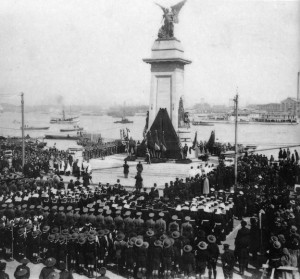July 30, 2014 | by LARB Blog

Photo: The dedication of the WWI memorial in Shanghai, in 1924.
By Maura Elizabeth Cunningham
World War I has always been primarily associated with Europe. That’s where the conflict began, where the major battles took place, and where the war had its most visible effect – the map of the continent was redrawn in its aftermath. But with the one hundredth anniversary of the war’s outbreak being commemorated this summer, we’re seeing more attention being paid to how non-European countries figured into “the war to end all wars.” Delhi-based writer Chandrahas Choudhury, for example, discusses India’s involvement in World War I in this Bloomberg View article, and The Guardian produced a documentary detailing the global nature of the conflict, though it’s still fairly Euro-centric.
China, too, became entangled in the fight in many different ways, and Penguin China is releasing a series of short “specials” that each focus on a specific aspect of China’s World War I history. These brief introductions (just about 100 pages), written by experienced journalists and historians, are available in Kindle editions and offer readers a quick overview of their subject matter.
I received review copies of four books in this series from Penguin China (there are two more titles scheduled for publication at the end of August) and arranged them in chronological order before I started reading. I began with The Siege of Tsingtao, in which journalist Jonathan Fenby recounts the story of the war’s only battle fought in East Asia, which took place in the fall of 1914. Tsingtao (now rendered as Qingdao, though the city’s famous beer retains the old spelling) was Germany’s main territorial holding in China and its base of naval operations in East Asia. Japan had long desired to expand its possessions in China, so it teamed up with Britain to attack the German port almost immediately after war was declared in Europe. Qingdao’s defenders never had a chance of keeping the settlement in German hands: they had few men and no supply lines. Though the Japanese and British forces were slowed down by heavy rains, they prevailed and took control of Qingdao by mid-November. Japan immediately moved to assert itself as the settlement’s new authority; its territorial ambitions in China would have long-reaching consequences.
